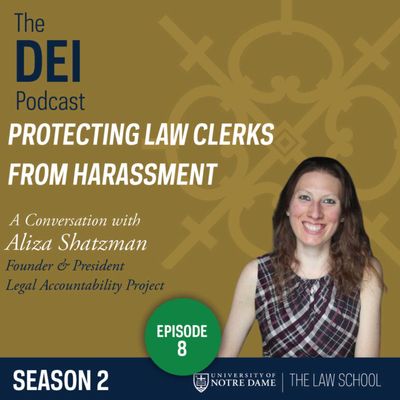Protecting Law Clerks from Harassment
Monday, March 4, 2024 12:00 pm EST

Judicial clerkships are typically characterized as an unadulterated good—lifelong mentor-mentee relationships between judges and law clerks that confer professional benefits. But little information exists to help law students identify positive work environments and avoid judges who mistreat their clerks.
At the Legal Accountability Project, Aliza Shatzman works to ensure that law clerks have positive clerkship experiences, and to provide resources to those who do not. In this conversation, Aliza describes her personal experiences with gender discrimination, harassment, and retaliation by a former DC Judge. Aliza also explains how Title VII of the Civil Rights Act does not extend to federal judicial employees, the need for greater diversity within judicial chambers, and the work LAP is doing to support greater judicial accountability.
The DEI Podcast with Max Gaston is sponsored by Notre Dame Law School and co-sponsored on ThinkND by the Black Alumni of Notre Dame, the Alumni Rainbow Community of Notre Dame (ARC ND), YoungND, Native American Alumni, Notre Dame Women Connect, Hispanic Alumni of Notre Dame, Notre Dame Senior Alumni, and Asian Pacific Alumni of Notre Dame. Register to receive emails about upcoming episodes of The DEI Podcast.



